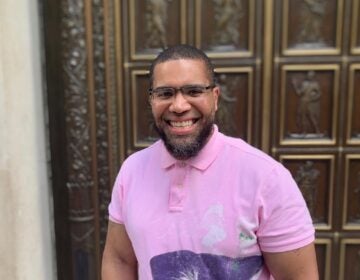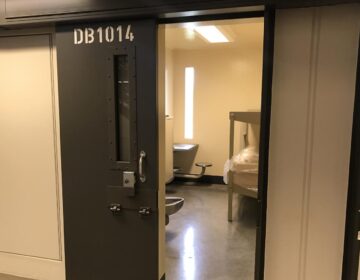Lawmakers seek to curb time inmates spend in solitary confinement
Advocates hope the bill will fare better under Murphy administration, given governor’s professed progressive opinions.

New Jersey lawmakers are trying again to limit the amount of time prisoners can be kept in isolated confinement, as well as the circumstances under which they can be sent to solitary (Emma Lee/WHYY, file)
This article originally appeared on NJ Spotlight.
—
New Jersey lawmakers are trying again to limit the amount of time prisoners can be kept in isolated confinement, as well as the circumstances under which they can be sent to solitary. An effort to do so three years ago got as far as former Gov. Chris Christie’s desk before being vetoed.
Advocates are hoping the Isolated Confinement Restriction Act, A-314, will pass both houses again and this time face a better fate with Gov. Phil Murphy, a progressive Democrat. The Assembly Judiciary committee on Monday moved the bill by a 4-2 vote, with both Republican members opposed.
The measure would prohibit the use of solitary confinement in correctional facilities unless it is deemed necessary to reduce the risk of serious harm to the inmate or others. A facility would have to justify the use of isolated confinement and then could only keep a person in solitary for 15 consecutive days or 20 days during a two-month period, said Assemblywoman Nancy Pinkin (D-Middlesex), prime sponsor of the bill.
“This does not end solitary confinement in New Jersey, but instead, it ensures that prisoners are not put in this form of confinement for months or years at a time,” she said. “Study after study shows that the use of long-term isolated confinement will have long-term detrimental effects on the person.”
Bringing NJ in line with UN
Pinkin and some of the advocates who testified Monday said the bill is an effort to bring New Jersey into conformance with a United Nations recommendation that defines more than 15 days in solitary confinement as torture. One UN expert said that just a few days of social isolation can cause some lasting mental damage.
“The extreme loneliness that I experienced in that time, it’s hard to live with and describe to this day,” said Marshall Justice Rountree, a social justice and criminal advocate, who said he spent at least five of the 23 years he served in state prison in solitary confinement, also called “administrative segregation” in New Jersey. “I do remember that I was ready to commit suicide.”
Pinkin noted there has been a nationwide movement to end the use of solitary confinement, which is defined by the Association of State Correctional Administrators (ASCA) as being locked up alone for at least 22 hours a day for at least 15 days. Eight states, including nearby New York and Connecticut, have reformed their rules, she said.
NJ exceeds national average for solitary
According to a report last year by the ASCA and the Arthur Liman Center at Yale University, New Jersey correctional facilities kept more than 1,000 prisoners — 5.2 percent of the incarcerated population — in solitary in 2017. That’s a higher proportion than the national average of 4.5 percent. The proportion of men kept in isolation was even higher in New Jersey — 6.2 percent, compared with a national rate of 4.2 percent.
Mark Hopkins was arrested at age 15 and waived up to serve time in an adult facility. He said he suffered “severe mental deterioration” when he was placed in solitary confinement at age 16. He said the way cells were arranged, other inmates watched him being strip-searched. The area was noisy, with other prisoners screaming and an industrial fan that the guards had tweaked to be very loud so they wouldn’t have to listen to the prisoners.
“The system has no guidelines,” he said.
Under the bill, inmates would have to receive a comprehensive medical and mental health examination, conducted by a medical professional, before being placed in isolated confinement and receive a daily evaluation while confined. An inmate could contest the confinement with 72 hours of placement and be removed from isolation if the facility administrator determines the confinement is no longer necessary. Those a clinician deems to be members of a vulnerable population, including those who have certain illnesses or disabilities or who are 21 or younger, 65 or older, or pregnant, would have to be removed from confinement.
Sudoku therapy
Several former inmates cheered those provisions. Lydia Thornton, who spent 9 1/2 months of five years incarcerated in solitary confinement, said all the guards would do if someone asked for mental or medical help was pass a Sudoku puzzle under the prisoner’s door.
“There’s a degradation to it, a dehumanization to it,” she said. “I call it no-touch torture.”
Nafeesa Goldsmith spent 60 days in administrative segregation while serving 13 years in the Edna Mahan women’s prison and wound up requiring medical treatment for severe dehydration as a result. She said there was not enough water coming from the faucet in her cell and she became dehydrated, experiencing dizziness and vomiting. When guards finally sent a nurse to see her, the nurse said she would provide Goldsmith with some ice.
Pinkin said studies suggest that it costs between $15,000 and $75,000 more a year to hold a prisoner in solitary and that money could be better spent elsewhere.
“We could devote more resources to hiring more staff,” she said. “If we take that money and redirect it to training and to providing services to the inmates we would be better served.”
Only one group, the County Jail Wardens Association, expressed opposition to the bill, but no one from the group testified specifically about their concerns.
Christie denied there is a problem
Three years ago, Christie issued a scathing message as he vetoed a similar bill and contended the state does not use solitary confinement but “restrictive housing,” adding that there are good reasons for doing so that have to do with safety and security.
“This is not a bill; it is ill-informed, politically motivated press release by a prime sponsor who proves once again, that he has no idea about law enforcement or what is being done by the very department he proposes to further regulate,” Christie wrote, referring to then-Sen. Raymond Lesniak, a Union County Democrat who gave up his seat to run unsuccessfully for governor in 2017. “This bill seeks to resolve a problem that does not exist in New Jersey.”
He added that the bill could put corrections officers and inmates alike in peril and called the “irresponsibility of this bill … truly breathtaking.”
Pinkin cited Colorado as a model in that the state reduced its use of solitary confinement and then saw assaults on guards by prisoners reduced by 85 percent.
“The lifelong effects do not lessen if you call it by a different name,” said Tess Borden, a staff attorney with the ACLU-New Jersey. “Isolated confinement is used in New Jersey. It is used in ways that are antithetical to sound and safe correctional policy … We must eliminate the cruel and arbitrary use of isolation.”
Rev. Charles Boyer, director of the organization Salvation and Social Justice, said there is strong support among the faith community for the legislation and urged lawmakers to act quickly.
“Hundreds of faith leaders see it as a moral issue that we treat prisoners in the most humane way as possible,” he said. “While we are all outside the walls living our lives, we have people inside literally suffering day after day after day … People are being isolated in some torturous conditions. Delaying this effort is literally delaying the liberation and relief of people suffering in real time.”
WHYY is your source for fact-based, in-depth journalism and information. As a nonprofit organization, we rely on financial support from readers like you. Please give today.




